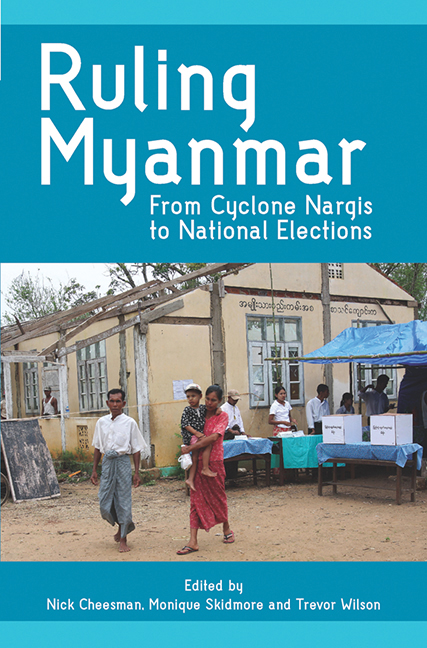Book contents
- Frontmatter
- Contents
- List of Tables
- List of Figures
- Background on ANU 2009 Myanmar/Burma Update Conference
- Acknowledgements
- Contributors and Editors
- Note on Terminology and Geographical Names
- Map of Myanmar
- Part I Overview
- Part II Political Legitimacy, Governance and Justice
- Part III Economic Development, the Rural Economy and Labour Rights
- Part IV The Role of International Cooperation and Governance
- 11 Cyclone Nargis and ASEAN: A Window for More Meaningful Development Cooperation in Myanmar
- 12 The Relief and Reconstruction Programme Following Cyclone Nargis: A Review of SPDC Policy
- 13 Positive Engagement in Myanmar: Some Current Examples and Thoughts for the Future
- 14 Normative Europe meets the Burmese Garrison State: Processes, Policies, Blockages and Future Possibilities
- 15 The Use of Normative Processes in Achieving Behaviour Change by the Regime in Myanmar
- List of Abbreviations
- Index
11 - Cyclone Nargis and ASEAN: A Window for More Meaningful Development Cooperation in Myanmar
from Part IV - The Role of International Cooperation and Governance
Published online by Cambridge University Press: 21 October 2015
- Frontmatter
- Contents
- List of Tables
- List of Figures
- Background on ANU 2009 Myanmar/Burma Update Conference
- Acknowledgements
- Contributors and Editors
- Note on Terminology and Geographical Names
- Map of Myanmar
- Part I Overview
- Part II Political Legitimacy, Governance and Justice
- Part III Economic Development, the Rural Economy and Labour Rights
- Part IV The Role of International Cooperation and Governance
- 11 Cyclone Nargis and ASEAN: A Window for More Meaningful Development Cooperation in Myanmar
- 12 The Relief and Reconstruction Programme Following Cyclone Nargis: A Review of SPDC Policy
- 13 Positive Engagement in Myanmar: Some Current Examples and Thoughts for the Future
- 14 Normative Europe meets the Burmese Garrison State: Processes, Policies, Blockages and Future Possibilities
- 15 The Use of Normative Processes in Achieving Behaviour Change by the Regime in Myanmar
- List of Abbreviations
- Index
Summary
INTRODUCTION
Cyclone Nargis struck Myanmar in May 2008, severely affecting the lives of 2.4 million of the 7.5 million people who live in the Ayeyarwaddy Delta. Approximately 140,000 people were killed or unaccounted for following the cyclone; 800,000 homes were destroyed or damaged, vital infrastructure was severely damaged, and water sources were contaminated. The cyclone not only destroyed physical assets in villages and inundated paddy land with sea water, but also washed away household assets, including food stocks from the recent harvest in April/ May, livestock, seeds and tools, leaving hundreds of thousands of people in a situation of food insecurity. Cyclone Nargis is the eighth-deadliest cyclone ever recorded and by far the worst natural disaster in the history of Myanmar. Damage and loss from the cyclone was estimated at US$4.1 billion (Tripartite Core Group 2008).
The total economic losses caused by the cyclone were detrimental to Myanmar's already underdeveloped economy. According to the 2007/ 2008 Human Development Report, GDP per capita (Purchasing Power Parity in US dollars) for Myanmar is US$1,027, the lowest in the region, as compared to US$29,663 for Singapore, US$8,677 for Thailand, or US$3,843 for Indonesia. At the same time, Official Development Assistance (ODA) to Myanmar in recent years has been about US$3 per capita per year. This is one of the lowest in the world. As shown in Table 11.1, the comparative figure for Laos is US$63 per capita, for Cambodia US$38, Sudan US$55 and Zimbabwe US$21.
ASEAN was asked to step in and facilitate the communication between the international humanitarian community and the Myanmar Government. Acknowledging the unprecedented scale of the disaster, ASEAN rose to the challenge and collaborated with the government to allow international relief workers to operate in the country. At the Special Meeting of the ASEAN Foreign Ministers in Singapore on 19 May 2008, the ministers recognized with appreciation the outpouring of goodwill and strong determination of the international community to help the victims of Cyclone Nargis.
- Type
- Chapter
- Information
- Ruling MyanmarFrom Cyclone Nargis to National Elections, pp. 197 - 207Publisher: ISEAS–Yusof Ishak InstitutePrint publication year: 2010



